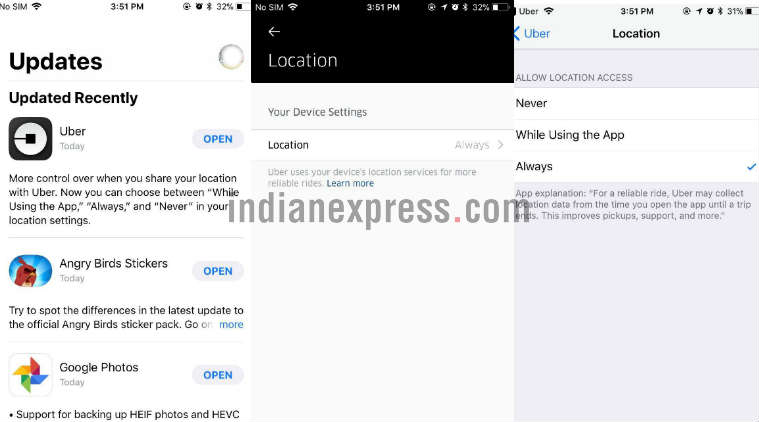Apple’s iOS 11 forces Uber to stop ‘Always On’ location tracking for users
Apple iOS 11 brings an important change, which is good news for Uber users. Uber users can now control the location information shared with the app.
 Apple iOS 11 update brings good news for Uber users: You can now turn off location sharing from ‘Always’ to ‘When using the App’
Apple iOS 11 update brings good news for Uber users: You can now turn off location sharing from ‘Always’ to ‘When using the App’
Apple iOS 11 brings an important change that should come as good news for Uber users. Uber, which had removed the ‘While using the app’ open for location privacy in settings has now brought it back. In the App Store, the description for Uber’s latest update also points out this big change.
It has been pointed out that iOS 11 software update doesn’t allow apps to not show ‘While using the app’ has an option for Location Privacy. This can explain why Uber has been forced to make the change and bring back the feature in its settings. Essentially this new update will let users control the kind of location information they share with Uber.
In iOS 10, Uber had removed the location privacy option from the app settings, which would have restricted usage. Instead location sharing was limited to two choices: Never and Always, which meant Uber had access to a user’s location data even when they were not using the app.
Uber users can now fix this by going to Settings in the app, and tap on Privacy settings. In there, tap the location option, and Uber will take the user to the Location Privacy settings in iOS System app. In here, users can choose ‘While using the app’ as an option.
Or just go to Settings>Privacy>Location Services>Uber and then choose the right option. Users should note that if they choose ‘Never’ as a privacy option for Uber in the Location services, then the app won’t work accurately and they might be unable to book a cab. The new update, though, will ensure Uber isn’t constantly using the location data. Users will have to update their iOS device to iOS 11 as well to get the new feature.
From a privacy perspective, iOS has always had the edge, especially when it comes to controlling apps and the kind of information they can access. Apple has always stressed on the importance of user privacy and data and giving options that let users control this quite easily. This is in sharp contrast to Android where apps still demand access to all sorts of rights, despite some of these not being compulsory for the functioning of the app in question.







